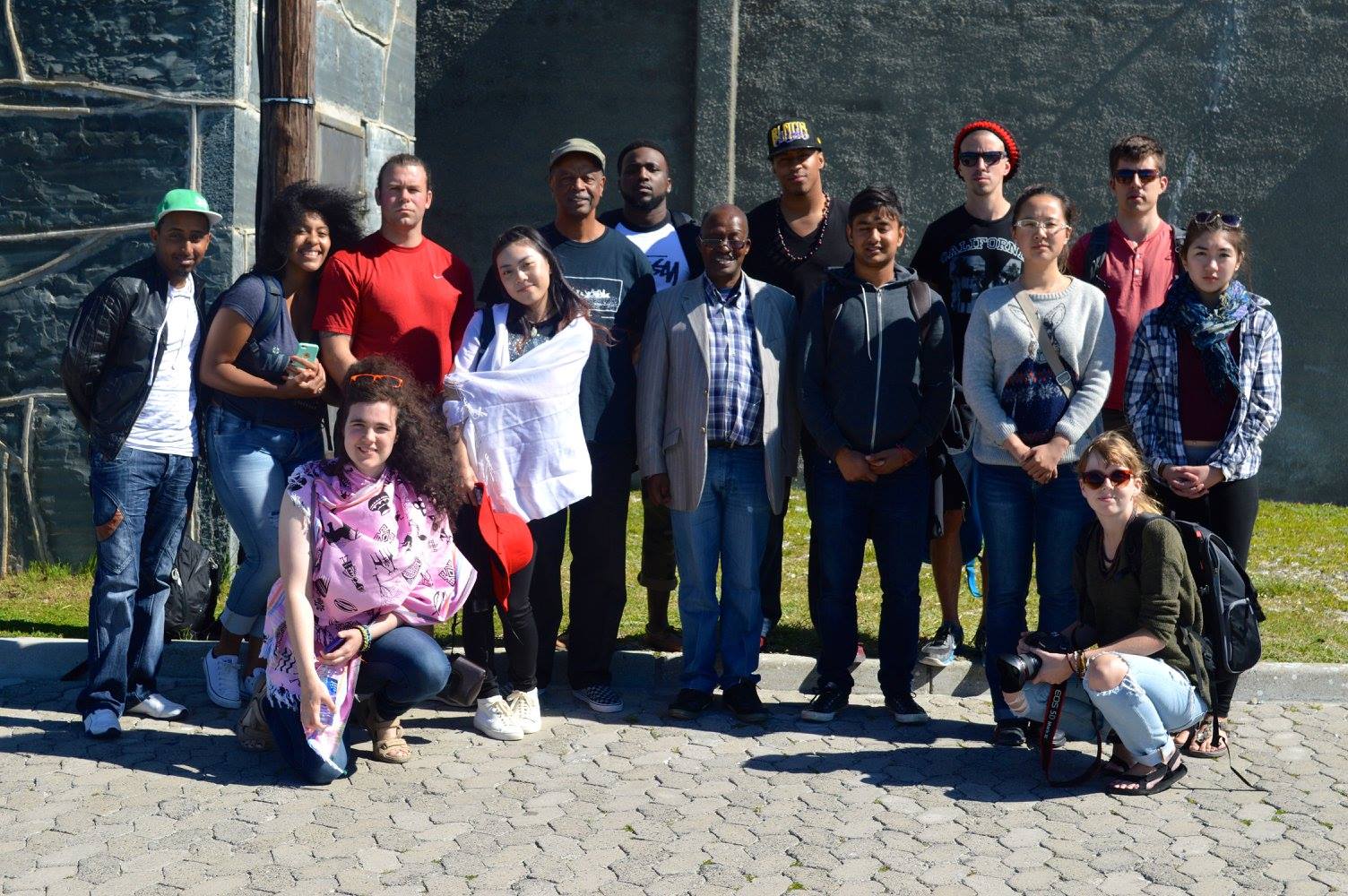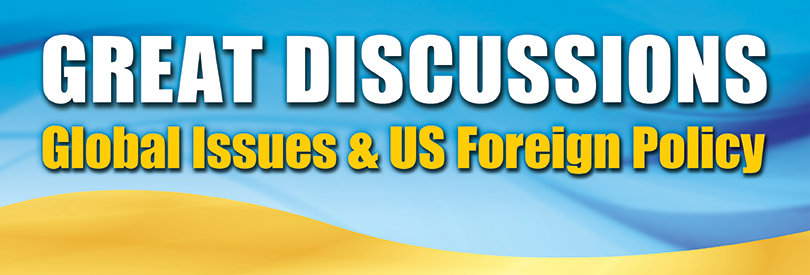May 31st, 2016 by pio@shoreline.edu
Check out this great slate of events from the World Affairs Council, a partner of Shoreline’s Global Affairs Center.
International Conflict on a Cyber Battlefield
Dr. Adam Segal, director of the Digital and Cyberspace Policy Program at the Council on Foreign Relations. Expert on security issues, technology development, and Chinese domestic and foreign policy.
June 1 @ 6:00 PM – 7:30 PM
Stoel Rives LLP
Register here
The United States in the Asia Pacific
featuring Lt. General Lanza, commander Joint Base Lewis-McChord, and Dane Chamorro, Senior Managnig Director of Control Risks South-East Asia.
June 2 @ 6:00 PM – 7 :30 PM
K&L Gates LLP
Register here
The Director of National Intelligence on “Global Threats to U.S. National Security”
James Clapper, Director of National Intelligence. Appointed by President Obama in 2010 and serving as his principal intelligence adviser.
June 3 @ 8:00 AM – 9:00 AM
Perkins Coie LLP
Register here
The Iran Deal and U.S. Policy in the Middle East
Featuring Ambassador William Luers, director of The Iran Project, and Jessica Tuchman Mathews, fellow at the Carnegie Endowment for International Peace.
June 9 @ 5:30 PM – 7:30 PM
Dorsey & Whitney LLP
Register here
Save the Date: Ambassador Bonnie Jenkins
June 16 @ 6:00 PM – 7:30 PM
Registration coming soon
Follow the Money: The Financial Instruments of U.S. Foreign Security
Adam J. Szubin, Acting Under Secretary for Terrorism and Financial Intelligence
June 27 @ 8:00 AM – 9:30 AM
Perkins Coie LLP
Registration coming soon
Posted in Announcements, Events Tagged with: global affairs center
April 14th, 2016 by pio@shoreline.edu
Here are the events happening around campus for Thurs., April 14.
Intramural Zumba, Athletics Room 3025
Thurs., April 14: 12:35-1:25 p.m.
Free to all Shoreline Community College students, faculty, and staff.
Artist’s Reception – Painting by Molly Magai, Admin (1000) bldg. gallery
Thurs., April 14: 4-6 p.m.
![MOLLY MAGAI Poster-email[5]](http://i0.wp.com/sccdaag.files.wordpress.com/2016/03/molly-magai-poster-email5.jpg?zoom=2&w=600&ssl=1)
Molly Magai makes paintings of landscapes dominated by cities, roads, industry, and the living things that inhabit them. These structures, created for human convenience, are very much in conflict with nature. They are also an awe-inspiring human accomplishment, the work of generations of builders and engineers. Most of us ignore these landscapes as we pass by them. Magai’s job as a genre painter is to make you see them, in their destructiveness and their beauty.
Magai make paintings based on snapshots she takes from a moving vehicle. Handicapped by the car’s speed, the camera creates inadvertent effects – unexpected colors, halos, and blurs. She is interested in the sensation of speed, and the way the image is filtered first through the camera, the painter, and the painting.
Intramural Personal Training, Athletics room 3007
Thurs., April 14: 6:05-6:50 p.m.
Free to all Shoreline Community College students, faculty, and staff.
Great Discussions Series: The Middle East, Room 1010(M)
Thurs., April 14: 6:30-8 p.m.
Part of the Great Discussions series. Part of an 8-part series, *registration is required. For more information go to the GAC website, or contact Larry Fuell (lfuell@shoreline.edu, 206-533-6750) or Elouiessa Muana (emuana2@shoreline.edu, 206-546-6996.
*Attending individual seminars is possible, if space available; contact Larry Fuell. $5 entrance fee collected at door.
Posted in Announcements, Events, Free, Workshops Tagged with: art gallery, gac, gallery, global affairs center
March 31st, 2016 by pio@shoreline.edu
Enrollment is limited. Click Here to Register Now!
What better way to (re)think about the world and America’s role than to share thoughts with friends and neighbors about some of the hottest foreign policy issues confronting the United States today. This series, utilizing Foreign Policy Association materials, will meet each Thursday evening for eight weeks, starting April 7 through May 26.
Topics we will discuss include:
- Middle East, April 7
- The Rise of ISIS, April 14
- Climate Change, April 21 **will take place in Room 9208 (Quiet Dining Room), and start at 7:00 pm, as part of a discussion about Biofuels and Climate Change
- The Future of Kurdistan, April 28
- Migration, May 5
- The Koreas, May 12
- The United Nations, May 19
- Cuba and the U.S., May 26
Students can receive credit for participating!! See below.
For more information go to the GAC website, or contact Larry Fuell (lfuell@shoreline.edu, 206-533-6750) or Elouiessa Muana (emuana2@shoreline.edu, 206-546-6996
*Attending individual seminars is possible, if space available; contact Larry Fuell. $5 entrance fee collected at door.
Issue brief summaries:
Middle East (April 7)
From a proxy war in Yemen to an ongoing civil war in Syria, a number of ongoing conflicts have shaken the traditional alliances in the Middle East to their core. As alliances between state and non-state actors in the region are constantly shifting, the U.S. has found itself between a rock and a hard place. In a series of conflicts that are far from being black-and-white, what can the U.S. do to secure its interests in the region without causing further damage and disruption?
The Rise of ISIS (April 14)
Born out of an umbrella organization of Al Qaeda in Iraq, the Islamic State in Iraq and Syria (ISIS) burst onto the international stage after it seized Falluja in December 2013. Since then, the group has seized control of a number of critical strongholds in the country and declared itself a caliphate, known as the Islamic State. Still, the question remains: What is ISIS, and what danger does it pose to U.S. interests?
Climate change (April 21)** Note: this discussion will take place in 9208, starting at 7 p.m.
In the past few years, the American public has become more aware of the damage wrought by climate change. From droughts in the west to extreme weather in the east, a rapidly changing climate has already made its footprint in the United States. Now, it’s expected that the presidential election in 2016 will be one of the first ever to place an emphasis on these environmental changes. What can the next president do to stymie this environmental crisis? And is it too late for these efforts to be effective?
The Future of Kurdistan (April 28)
Kurdistan, a mountainous region made up of parts of Turkey, Iraq, Iran, Armenia and Syria, is home to one of the largest ethnic groups in West Asia: the Kurds. Now, most in the West know them for their small, oil-rich autonomous region in northern Iraq called Iraqi Kurdistan — one of the U.S.’ closer allies in the Middle East and a bulwark against the expansion of the so-called Islamic State. What does the success of Iraqi Kurdistan mean for Kurds in the surrounding region?
Migration (May 5)
As a record number of migrants cross the Mediterranean Sea to find refuge in Europe, the continent is struggling to come up with an adequate response. Although Europe’s refugees are largely fleeing conflicts in Syria, Iraq and parts of Africa, their struggle is hardly unique. Today, with the number of displaced people is at an all-time high, a number of world powers find themselves facing a difficult question: How can they balance border security with humanitarian concerns? More importantly, what can they do to resolve these crises so as to limit the number of displaced persons?
The Koreas (May 12)
At the end of World War II, Korea was divided in two. The northern half of the Korean peninsula was occupied by the Soviet Union, the southern by the United States. Today, North and South Korea couldn’t be further apart. The North is underdeveloped, impoverished and ruled by a corrupt, authoritarian government, while the South advanced rapidly to become one of the most developed countries in the world. With such a wide gap, some are asking if unification is possible, even desirable, anymore?
The United Nations (May 19)
On the eve of the international organization’s 70th birthday, the United Nations stands at a crossroads. This year marks a halfway point in the organization’s global effort to eradicate poverty, hunger and discrimination, as well as ensure justice and dignity for all peoples. But as the UN’s 193 member states look back at the success of the millennium development goals, they also must assess their needs for its sustainable development goals — a new series of benchmarks, which are set to expire in 2030. With the appointment of the ninth secretary-general in the near future as well, the next U.S. president is bound to have quite a lot on his or her plate going into office.
Cuba and the U.S. (May 26)
The U.S. announced in December 2014 that, after decades of isolation, it has begun taking major steps to normalize relations with Cuba, its neighbor to the south. The announcement marks a dramatic shift away from a policy that has its roots in one of the darkest moments of the Cold War — the Cuban missile crisis. Although the U.S. trade embargo is unlikely to end any time soon, American and Cuban leaders today are trying to bring a relationship once defined by a crisis in the 1960s into the 21st century.
Posted in Announcements, Events, Workshops Tagged with: current events, global affairs center, great discussions
March 22nd, 2016 by pio@shoreline.edu
Enrollment is limited. Click Here to Register Now!
What better way to (re)think about the world and America’s role than to share thoughts with friends and neighbors about some of the hottest foreign policy issues confronting the United States today. This series, utilizing Foreign Policy Association materials, will meet each Thursday evening for eight weeks, starting April 7 through May 26.
Topics we will discuss include:
- Middle East, April 7
- The Rise of ISIS, April 14
- Climate Change, April 21 **will take place in Room 9208 (Quiet Dining Room), and start at 7:00 pm, as part of a discussion about Biofuels and Climate Change
- The Future of Kurdistan, April 28
- Migration, May 5
- The Koreas, May 12
- The United Nations, May 19
- Cuba and the U.S., May 26
Students can receive credit for participating!! See below.
For more information go to the GAC website, or contact Larry Fuell (lfuell@shoreline.edu, 206-533-6750) or Elouiessa Muana (emuana2@shoreline.edu, 206-546-6996
*Attending individual seminars is possible, if space available; contact Larry Fuell. $5 entrance fee collected at door.
Issue brief summaries:
Middle East (April 7)
From a proxy war in Yemen to an ongoing civil war in Syria, a number of ongoing conflicts have shaken the traditional alliances in the Middle East to their core. As alliances between state and non-state actors in the region are constantly shifting, the U.S. has found itself between a rock and a hard place. In a series of conflicts that are far from being black-and-white, what can the U.S. do to secure its interests in the region without causing further damage and disruption?
The Rise of ISIS (April 14)
Born out of an umbrella organization of Al Qaeda in Iraq, the Islamic State in Iraq and Syria (ISIS) burst onto the international stage after it seized Falluja in December 2013. Since then, the group has seized control of a number of critical strongholds in the country and declared itself a caliphate, known as the Islamic State. Still, the question remains: What is ISIS, and what danger does it pose to U.S. interests?
Climate change (April 21)** Note: this discussion will take place in 9208, starting at 7 p.m.
In the past few years, the American public has become more aware of the damage wrought by climate change. From droughts in the west to extreme weather in the east, a rapidly changing climate has already made its footprint in the United States. Now, it’s expected that the presidential election in 2016 will be one of the first ever to place an emphasis on these environmental changes. What can the next president do to stymie this environmental crisis? And is it too late for these efforts to be effective?
The Future of Kurdistan (April 28)
Kurdistan, a mountainous region made up of parts of Turkey, Iraq, Iran, Armenia and Syria, is home to one of the largest ethnic groups in West Asia: the Kurds. Now, most in the West know them for their small, oil-rich autonomous region in northern Iraq called Iraqi Kurdistan — one of the U.S.’ closer allies in the Middle East and a bulwark against the expansion of the so-called Islamic State. What does the success of Iraqi Kurdistan mean for Kurds in the surrounding region?
Migration (May 5)
As a record number of migrants cross the Mediterranean Sea to find refuge in Europe, the continent is struggling to come up with an adequate response. Although Europe’s refugees are largely fleeing conflicts in Syria, Iraq and parts of Africa, their struggle is hardly unique. Today, with the number of displaced people is at an all-time high, a number of world powers find themselves facing a difficult question: How can they balance border security with humanitarian concerns? More importantly, what can they do to resolve these crises so as to limit the number of displaced persons?
The Koreas (May 12)
At the end of World War II, Korea was divided in two. The northern half of the Korean peninsula was occupied by the Soviet Union, the southern by the United States. Today, North and South Korea couldn’t be further apart. The North is underdeveloped, impoverished and ruled by a corrupt, authoritarian government, while the South advanced rapidly to become one of the most developed countries in the world. With such a wide gap, some are asking if unification is possible, even desirable, anymore?
The United Nations (May 19)
On the eve of the international organization’s 70th birthday, the United Nations stands at a crossroads. This year marks a halfway point in the organization’s global effort to eradicate poverty, hunger and discrimination, as well as ensure justice and dignity for all peoples. But as the UN’s 193 member states look back at the success of the millennium development goals, they also must assess their needs for its sustainable development goals — a new series of benchmarks, which are set to expire in 2030. With the appointment of the ninth secretary-general in the near future as well, the next U.S. president is bound to have quite a lot on his or her plate going into office.
Cuba and the U.S. (May 26)
The U.S. announced in December 2014 that, after decades of isolation, it has begun taking major steps to normalize relations with Cuba, its neighbor to the south. The announcement marks a dramatic shift away from a policy that has its roots in one of the darkest moments of the Cold War — the Cuban missile crisis. Although the U.S. trade embargo is unlikely to end any time soon, American and Cuban leaders today are trying to bring a relationship once defined by a crisis in the 1960s into the 21st century.
Posted in Announcements, Events, Workshops Tagged with: gac, global affairs center, great discussions
February 10th, 2016 by pio@shoreline.edu
Here are the events happening around campus for Thursday, Feb. 11.
Advising Day! Table in the Library, 10 a.m. – 1 p.m.

Planning to graduate at the end of Winter quarter? Your application for graduation should be submitted by February 15. Still have questions? Come talk with an advisor in the library.
Personal Transformation and Travel to South Africa, PUB 9208, 11:30 a.m. – 12:30 p.m.
*A Sequel Report on the summer 2015 Study Abroad Experience

This past summer, a group of students, led by Professor Ernest Johnson, experienced a 4-week summer program in Cape Town where they examined the social and cultural history of South Africa, and explored current efforts to create a democratic, multicultural nation.
During this session, the students will report on what they felt and what they heard from the people they met. They participated in many social events and historical lectures, including school visits, lectures by community leaders, and home-stays inside “Black” townships and homelands.
Intramural Zumba, Athletics bldg., room 3025, 12:35-1:25 p.m.
Take time out from your busy day to dance your way fit. Free to students, faculty, and staff.
Planning for a Science Degree, Library Classroom 4214, 1-2:30 p.m.
Science faculty advisers will discuss requirements and course sequencing for the Associate in Science Degree Track 1 and 2. In addition, the advisers will help each student draft an individual educational (course) plan.
Managing and Prioritizing Your Time, PUB 9208, 1:30-2:30 p.m.

Part 1 of the Time Management Series:
Creating and establishing a study schedule and planning for your quarter are keys to supporting your success. Learning and practicing time management is an important part of your school and work life. Come explore your goals and priorities and learn how to create a plan for YOU and YOUR SUCCESS this quarter!
*This session will be recorded and posted online. To view go to our YouTube site.
Intramural Personal Training, Athletics bldg. Room 3007, 6-6:50 p.m.
Come get free, hands-on training to help you reach your fitness goals.
Posted in Announcements, Arts & Entertainment, Clubs, Events, Free, Workshops Tagged with: advising and counseling, global affairs center, intramurals, success series
February 1st, 2016 by pio@shoreline.edu

The Global Affairs Center Presents: Political and Economic Changes In Myanmar (Burma) Wed., Feb. 3 from 7-8:30 p.m. in the PUB Quiet Dining Room (9208).
Myanmar (Burma) is undergoing significant political and economic reforms. On November 8, 2015, The National League for Democracy, led by Daw Aung San Suu Kyi (who was under house arrest from 1989 to 2010), won a stunning nationwide election, defeating a military establishment that has ruled Myanmar since 1962. The country’s election commission announced that the party had won 348 seats, enough for a majority in Parliament, and well more than the 40 won by the ruling (military) party. Yet the military will continue to hold many levers of power, suggesting that a complex dance between entrenched interests and the will of the people is the new reality.
The Republic of the Union of Myanmar, formerly known as Burma (until 1989), is the second largest country in Southeast Asia and boasts a population of more than 50 million. Myanmar emerged from British colonial rule in 1948, and has remained under military control since General Ne Win overthrew the civilian government in a 1962 coup. The country’s modern history has been marred by persistent human rights violations, ethnic strife, cronyism and failed state-run economic management that has resulted in widespread poverty.
Join our discussion about Myanmar’s political and economic changes, together with Larry Dohrs, Chairman, U.S. Campaign for Burma.
For more information about Larry Dohrs, visit our biographies page.
Posted in Announcements, Events, Free, Workshops Tagged with: gac, global affairs center, larry dohrs, myanmar
January 25th, 2016 by pio@shoreline.edu

Join us Tues., Jan. 26 in the PUB Quiet Dining Room (9208) from 11:30 a.m. – 12:30 p.m. for Online News in the Digital Age.
Traditional news media are undergoing fundamental change. Old platforms, such as printed newspapers, magazines, TV and radio, are being supplanted by new platforms fueled by technological changes, including computers, tablets, and cell phones. News consumers are no long viewed as passive customers but as interactive participants who react to and sometime shape news through chat rooms, comment sections, online posts, and the like.
We hear a lot about collapsing economic models of the news industry, but less about changing models of news content as a result of these changes.
Here to discuss these trends as experienced first-hand are Dan DeMay and Jimmy Lovaas, both graduates of Shoreline Community College, and both now working for major online news services.
To learn more about our guest speakers, visit our biographies page.
Posted in Announcements, Events, Free Tagged with: global affairs center
January 25th, 2016 by pio@shoreline.edu

Join us Tues., Jan. 26 in the PUB Quiet Dining Room (9208) from 11:30 a.m. – 12:30 p.m. for Online News in the Digital Age.
Traditional news media are undergoing fundamental change. Old platforms, such as printed newspapers, magazines, TV and radio, are being supplanted by new platforms fueled by technological changes, including computers, tablets, and cell phones. News consumers are no long viewed as passive customers but as interactive participants who react to and sometime shape news through chat rooms, comment sections, online posts, and the like.
We hear a lot about collapsing economic models of the news industry, but less about changing models of news content as a result of these changes.
Here to discuss these trends as experienced first-hand are Dan DeMay and Jimmy Lovaas, both graduates of Shoreline Community College, and both now working for major online news services.
To learn more about our guest speakers, visit our biographies page.
Posted in Announcements, Events, Free, Workshops Tagged with: global affairs center
January 19th, 2016 by pio@shoreline.edu

Join us Thurs., Jan. 21 at 7 p.m. in the Black Box Theater (bottom floor of the 4000 bldg.) for “Civil Rights and the Movies,” a discussion of how the topic of civil rights is portrayed in film globally. This FREE event is brought to you by the Global Affairs Center.
How are civil rights portrayed in films around the world? Does “civil rights” mean the same thing in Asia, the Middle East and Europe, as it does in the United States? How have movies been a platform in other countries and regions for raising awareness of and advocating civil rights?
Join us for a discussion of Civil Rights and the Movies, with:
• Chris Fisher, Drama/Cinema Department, Shoreline Community College
• Duygu Erdogan Monson, Turkish Actor, and Drama/Cinema Department, Shoreline Community College
• William Lindenmuth, SCC Philosophy (Moderator)
Posted in Announcements, Events, Free Tagged with: #MLKDay, civil rights, global affairs center
November 20th, 2015 by pio@shoreline.edu

Join the GAC on Tues., Nov. 24 in the PUB 9208 from 10:30-11:20 a.m. for a presentation on “Dental Hygiene and Nursing Service Learning in Bolivia.”
Working with the Smiles Forever Foundation, a non-profit organization based in Seattle, a group of Nursing and Dental Hygiene students from Shoreline Community College had the chance of a lifetime to see firsthand how simple healthcare practices can make a difference in impoverished communities.
Led by Shoreline faculty members Katie Fleming and Lisa Libassi, this two-week program enabled students to explore medical issues and disease treatment in an environment with limited equipment. They visited the first and only dental hygiene school in Cochabamba, Bolivia. Nursing students had numerous opportunities to work in hospital and clinic settings, as well as in public health facilities and to conduct medical screening health fairs.
Join us on November 24 when Katie and Lisa will discuss how this experience gave their students a broader understanding of diverse cultures and complex health and political issues. For more information about Katie Fleming and Lisa Libassi, visit our biographies page.
Posted in Announcements, Events, Free Tagged with: dental hygiene, global affairs center, nursing service learning
![MOLLY MAGAI Poster-email[5]](http://i0.wp.com/sccdaag.files.wordpress.com/2016/03/molly-magai-poster-email5.jpg?zoom=2&w=600&ssl=1)







